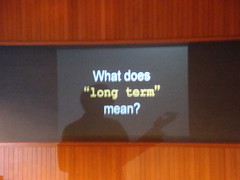Eric Jackson, Contributor
 Image via WikipediaWhether it’s a high-profile tech company like Yahoo!, or a more established conglomerate like GE or Home Depot, large companies have a hard time keeping their best and brightest in house. …
Image via WikipediaWhether it’s a high-profile tech company like Yahoo!, or a more established conglomerate like GE or Home Depot, large companies have a hard time keeping their best and brightest in house. …Yet, Yahoo!, GE, Home Depot, and other large established companies have a tremendous advantage in retaining their top talent and don’t. … Here’s my Top Ten list of what large companies do to lose their top talent :
1. Big Company Bureaucracy. This is probably the #1 reason we hear after the fact from disenchanted employees. … No one likes rules that make no sense. But, when top talent is complaining along these lines, it’s usually a sign that they didn’t feel as if they had a say in these rules. They were simply told to follow along and get with the program. No voice in the process and really talented people say “check please.”
2. Failing to Find a Project for the Talent that Ignites Their Passion. Big companies … usually don’t have people going around to their best and brightest asking them if they’re enjoying their current projects or if they want to work on something new that they’re really interested in which would help the company. … Top talent isn’t driven by money and power, but by the opportunity to be a part of something huge, that will change the world, and for which they are really passionate. …
3. Poor Annual Performance Reviews. You would be amazed at how many companies do not do a very effective job at annual performance reviews. … The impression this leaves with the employee is that my boss — and, therefore, the company — isn’t really interested in my long-term future here. … This one leads into #4….
4. No Discussion around Career Development. Here’s a secret for most bosses: most employees don’t know what they’ll be doing in 5 years. … However, everyone wants to have a discussion with you about their future. … If your best people know that you think there’s a path for them going forward, they’ll be more likely to hang around.
 Image by learningexecutive via Flickr5. Shifting Whims/Strategic Priorities. … Top talent hates to be “jerked around.” If you commit to a project that they will be heading up, you’ve got to give them enough opportunity to deliver what they’ve promised.
Image by learningexecutive via Flickr5. Shifting Whims/Strategic Priorities. … Top talent hates to be “jerked around.” If you commit to a project that they will be heading up, you’ve got to give them enough opportunity to deliver what they’ve promised. 6. Lack of Accountability and/or telling them how to do their Jobs. Although you can’t “jerk around” top talent, it’s a mistake to treat top talent leading a project as “untouchable.” … [Top] talent demands accountability from others and doesn’t mind being held accountable for their projects. Therefore, have regular touch points with your best people as they work through their projects. They’ll appreciate your insights/observations/suggestions — as long as they don’t spillover into preaching.
 Image via Wikipedia7. Top Talent likes other Top Talent. … Many organizations keep some people on the payroll that rationally shouldn’t be there. … [Doing]exit interviews with the best people leaving big companies you often hear how they were turned off by some of their former “team mates.” If you want to keep your best people, make sure they’re surrounded by other great people.
Image via Wikipedia7. Top Talent likes other Top Talent. … Many organizations keep some people on the payroll that rationally shouldn’t be there. … [Doing]exit interviews with the best people leaving big companies you often hear how they were turned off by some of their former “team mates.” If you want to keep your best people, make sure they’re surrounded by other great people. 8. The Missing Vision Thing. This might sound obvious, but is the future of your organization exciting? … What is the vision you want this talented person to fulfill? Did they have a say/input into this vision? If the answer is no, there’s work to do — and fast.
9. Lack of Open-Mindedness. The best people want to share their ideas and have them listened to. However, a lot of companies have a vision/strategy which they are trying to execute against — and, often find opposing voices to this strategy as an annoyance and a sign that someone’s not a “team player.” If all the best people are leaving and disagreeing with the strategy, you’re left with a bunch of “yes” people saying the same things to each other. You’ve got to be able to listen to others’ points of view — always incorporating the best parts of these new suggestions.
10. Who’s the Boss? If a few people have recently quit at your company who report to the same boss, it’s likely not a coincidence. …You’re better off trying to find another spot for them in the organization — or, at the very least, not overseeing your high-potential talent that you want to keep.
It’s never a one-way street. Top talent has to assume some responsibility as much as the organization. However, with the scarcity of talent — which will only increase in the next 5 years — Smart Organizations are ones who get out in front of these ten things, rather than wait for their people to come to them, asking to implement this list.







No comments:
Post a Comment